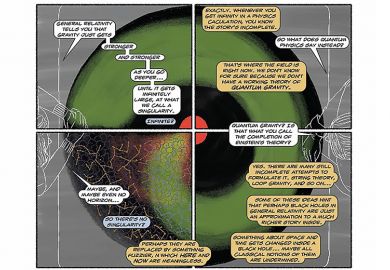There is no question that the arrival of quantum mechanics early in the 20th century transformed physics and our understanding of the natural world. It is a theory that underpins modern developments in lasers, transistors and semiconductors. In What is Real?, Adam Becker explores some of the philosophical tensions that arose with quantum mechanics.
Becker takes the side of the “realists” such as Albert Einstein and Erwin Schrödinger, and later David Bohm, John Stewart Bell and Hugh Everett, who argued that quantum mechanics must reflect some underlying “reality” rather than a series of abstract mathematical probabilities. At stake is the link between the quantum world, where particles do weird and wonderful (but predictable) things, and the world of classical physics, where I know that if I drop a brick on my foot, it is going to hurt.
Becker sets it up as a “good versus evil” story, with our realist heroes fighting the shady forces of what is known as the “Copenhagen interpretation”, championed by Niels Bohr with the backing of the majority of influential physicists of the day. This “interpretation” is an ill-defined thing, which nonetheless Becker asserts is the core of modern physical thought, described in all modern textbooks. What is actually described in textbooks is a workaround fudge that makes the link between quantum behaviour and classical physics, and it is in the textbooks because it works.
It leaves a hole: something known as the “measurement problem”, best exemplified by Schrödinger’s cat in a box. In this famous thought experiment, the Copenhagen interpretation leaves us with a cat that is simultaneously both alive and dead, remaining this way until the box is opened. The act of measuring the outcome determines the outcome. But what is a measurement? Is it the opening of the box? My observation of the cat?
This is clearly ludicrous. What is also strange, though, is Becker’s contention that this is the status quo in physics and has shut down the consideration of alternatives. There is a hole here, but it doesn’t stop us from cracking on with the applications of quantum mechanics, because the fudge works.
Becker considers a number of possible alternatives. In Everett’s many-worlds hypothesis, for example, all possibilities split into parallel universes – for example, one in which Schrödinger’s cat is alive and one in which it is dead. This is untestable, and therefore unfalsifiable, and replaces the measurement problem with another: how does the act of measurement split the outcome into parallel universes? We are no further forward. And yet, with a headache and a fatalist shrug, physicists proceed.
So this is more of a philosophical debate: do we need to know whether there is an underpinning reality to quantum mechanics? The answer is both yes and no. Yes, because anything else is unsatisfying, but also no, because our fudge works. Becker is correct in that adopting an underpinning philosophy can determine which experiments are done, and adopting an incorrect paradigm can lead us down the wrong path, sometimes for centuries. But it was ever thus. Science is a series of stories we use to describe the world. We’ve left a bookmark in one chapter marked “return to this later” and continued on. The story isn’t finished yet.
Cait MacPhee is professor of biological physics at the University of Edinburgh.
What is Real?: The Unfinished Quest for the Meaning of Quantum Physics
By Adam Becker
John Murray, 384pp, £25.00
ISBN 9781473661356
Published 31 May 2018
POSTSCRIPT:
Print headline: Pin the tale on the paradigm
Register to continue
Why register?
- Registration is free and only takes a moment
- Once registered, you can read 3 articles a month
- Sign up for our newsletter
Subscribe
Or subscribe for unlimited access to:
- Unlimited access to news, views, insights & reviews
- Digital editions
- Digital access to THE’s university and college rankings analysis
Already registered or a current subscriber?








